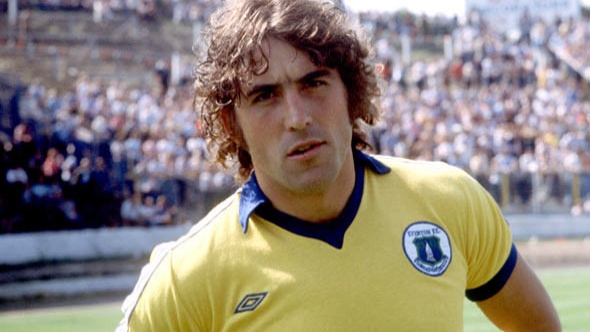
The path of a successful footballer’s career tends to be a common one these days. A spot in the lower leagues, maybe a dalliance with management or backroom staff and then onto the pundits couch for inevitable hot takes and a click-friendly social media account. That last seems to be the most popular with any number of local radio stations welcoming an ex-pro regardless of their analytical or communication skills. If you’ve been on a pitch at a decent level, people will always listen.
Before the Sky era that path was less marked. The most popular choice was to run a pub—ideal given the drinking culture of the 70s and 80s and the thrall of seeing their famous friends in the snug. A chance to sit with a couple of faces from the game and listen to them reminisce is very difficult to turn down.
Bob Latchford, once subject of the country’s most expensive transfer deal, found a third route. Ever a private man, he chose to disappear.
Younger readers may have difficulty bringing Bob’s face to mind and doubtless he’d be fine with that, but speak to any Evertonian of a certain vintage and their faces will light up at his name. Give them a few minutes and talk will inevitably turn to the 1977-78 season when the six-foot Birmingham born striker netted 30 league goals for the Goodison outfit – a feat only equalled once since in the club’s history by a man who currently hosts Match of the Day—something Latchford would never contemplate. He’s just not that sort of man.
Robert Dennis Latchford came from a footballing family. While his older brother Dave kept goal at Birmingham City and Peter, 18 months his junior, played for Celtic for 12 years, Bob claims it was his father John who had the real talent. Sadly though, John Latchford’s parents didn’t approve of making a living from the game so he ensured his sons were afforded the chances he’d been denied.
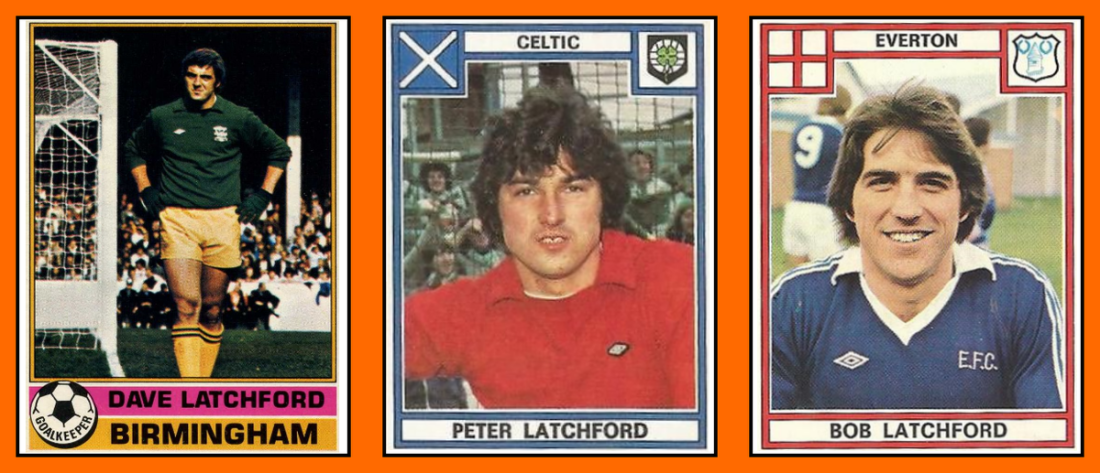
(Image from @OldSchoolPanini)
Bob signed for home club Birmingham City as a youth player in 1967 where he was to eventually play alongside a very young Trevor Francis. Here he is looking not unlike PC Terry Hoskins, Roy Slater’s sidekick in Only Fools and Horses.
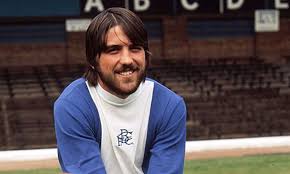
On 22nd March 1969 he made his debut at St Andrews, scoring twice in a 3-1 win over Preston North End. He was to make only four appearances that season and managed only ten more the following season, but, come the 1970-71 season he became a regular. However, it was in 1971-72 campaign where he really came into his own.
His 23 League goals, including two hat-tricks, saw the Blues promoted to the top flight for the first time in 32 years. Norwich City went up as champions while Birmingham spent much of the season in third and fourth place. In fact, it was only the final week of the season which saw them in the promotion places and it was Latchford’s solitary goal against Orient which gave them the vital points.
In February 1974 with 68 goals and 160 appearances, Latchford chose to leave Birmingham and headed to Billy Bingham’s Everton. The deal was worth a record £350,000 though Birmingham only saw £80,000 of it due to Howard Kendall and Archie Styles moving in the opposite direction. It wasn’t a popular move with the fans and it still isn’t to this day as many think the club could have done more to keep him, particularly as Blues manager Freddie Goodwin swore blind that he’d never sell him.
A month later he scored his first goals at Goodison Park against, yes, Birmingham City and thus became the first player top-flight player to score twice against a sibling.
He would go on to score 106 goals in a seven year career and become the club’s most prolific post-war scorer before Graeme Sharp overtook him with 111 goals from 1980 to 1991, but it was the 1977-78 season which made him revered and mentioned in the same breath as Everton’s greatest player.
For all that, Everton’s season started poorly. An opening fixture against the eventual champions Nottingham Forest saw the Toffees go down 1-3 and things didn’t get any better at Highbury three days later when Arsenal defender Rickie Powling scored the only goal of the game. However, once that tricky start was over Everton did not lose a league game until Boxing Day.
Duncan McKenzie scored twice in the next game to secure the first points of the season before a goalless draw at Wolves. Then, frankly, Bob Latchford went nuts.
Four goals away to QPR, two against Newcastle and Birmingham (again), a hat-trick at home to Coventry and another couple against Middlesbrough saw him with 17 League goals before Christmas. It was only when Manchester United visited on and hammered the Toffees 6-2 that they were finally vanquished. Latchford with one of the consolation goals. In March and April 1978 he scored seven goals in seven games.
With his goal scoring tally in the late twenties, a national newspaper offered Latchford £10,000 if he could end the season with 30 league goals. No one had managed this feat since earlier in the decade when Franny Lee scored 33 in 1971-72. This was a real windfall as players wages were nowhere near what they are now.
He was on 28 when Chelsea visited Goodison Park on the final game of the campaign and Latchford set about them from the first whistle.
And getting nowhere.
Everton raced into a 3-0 lead, but the goal-scorers were Martin Dobson, Neil Robertson and Billy Wright. With 18 minutes left on the clock Latchford headed home to take him onto 29, but he was soon apoplectic with rage when defender Mick Lyons crashed in the fifth when Latchford was better placed for a tap-in. The quiet number nine vented full spleen and reminded his captain which end of the pitch he belonged. Minutes later Lyons won a penalty against Micky Droy and gave him the ball. Goal number 30 arrived.
Latchford gave half of that money to the PFA and £4,000 to his team mates, keeping just £1,000 for himself. The good people at the HMRC didn’t believe him and took him to court. He lost but, as he put it, ‘but what a great day!’
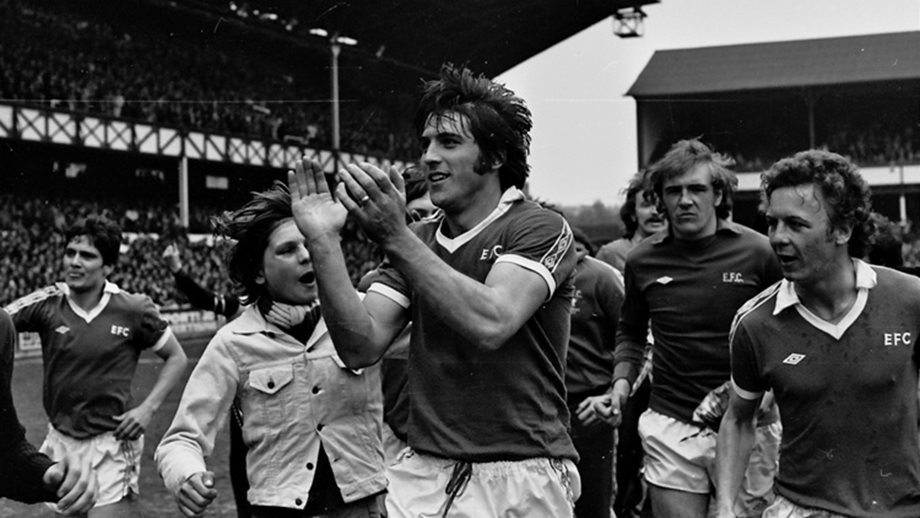
After the game he was congratulated by Dixie Dean. As they shook hands, the legendary striker who scored an insurmountable 60 goals in the 1927-28 season told him with a smile ‘Don’t forget. You’re only half as good as me!’
Everton finished third in the league, just two points behind second placed Liverpool with the same goal difference, though Nottingham Forest were streets ahead of both Merseyside clubs.
Latchford summed up Everton’s problem in 2006 during a rare interview with The Guardian:
‘We qualified for Europe, we got to FA Cup semi-finals, we were competing for championships, but it was dark days because we ended up coming short. And Liverpool were so dominant. If you took that Everton team and put it in the era we have now, the fans would be jumping for joy.’
Bob left Everton in the summer of 1981 to be a part of the Swansea City side revolutionised by John Toshack. The former Cardiff City striker, who became the youngest manager in the league when he joined in March 1978, had overseen a remarkable rise through all four divisions to take their place in the top flight and persuading the big man to leave Goodison was a remarkable coup.
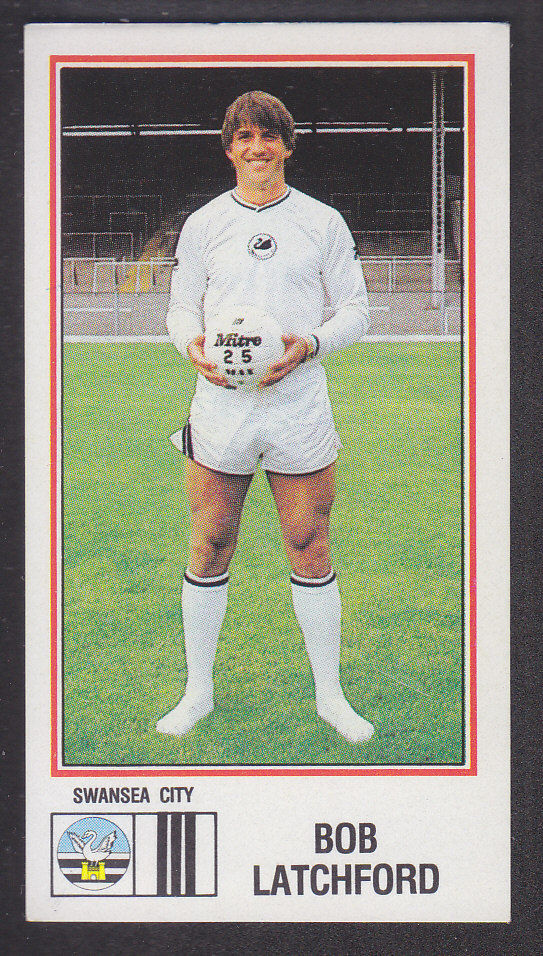
30 year old Bob Latchford made his debut for them in the opening game against Leeds United.
Hat-trick.
And that was just the start.
Once again he kept up his remarkable goal-scoring record with goals against both Liverpool and Everton as the Swans finished a creditable sixth in the League having briefly topped the table earlier in the season.
The second season, however, was disastrous as financial difficulties beset the club. One by one the stars left with Latchford staying loyal as long as possible. His consolation goal at Old Trafford in May 1983 was to be Swansea’s last in the top flight for 28 years. Following relegation he played a further 18 games before he had to move on.
He says of that last season:
‘It definitely soured my second season on the pitch because of the things that were happening. Everything from the top to bottom was not right. The more games we lost the worse things became. Things fell apart and it was not a nice experience.’
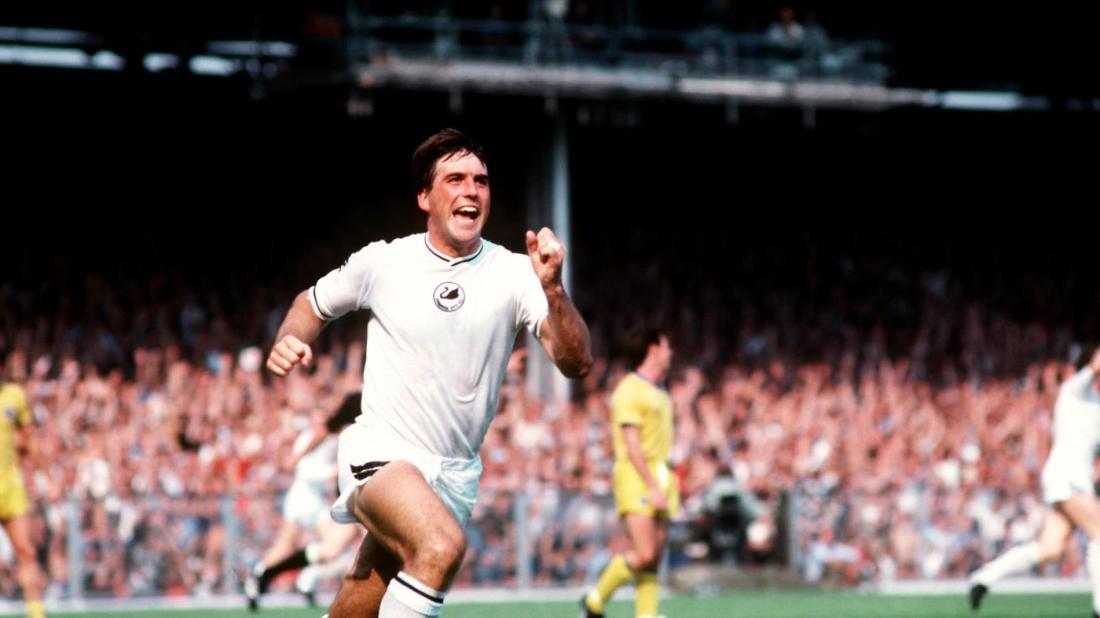
Over the next two seasons with the years beginning to tell, he turned out for NAC Breda of Holland (13 goals in 16 appearances), Coventry City and Lincoln City before returning to South Wales for spells at Newport County and Merthyr Tydfil. He retired in July 1987 following a career of 546 games with 231 goals. He also scored five goals in twelve games at international level for England.
It’s here where you’d expect to hear tales of pub management or spots on Radio Merseyside, but Bob more or less turned his back on the game save for the odd wave to the crowd as guest of honour at Goodison or the Vetch Field. A self-effacing man, Bob led a quiet life and chose not to exploit his legendary status at his former clubs.
Sadly, his wife Pat passed away in 2000. He then moved to Germany to start a new life where he remains today. He published his autobiography, A Different Road, in 2015.
I write these words as a Liverpool fan, but I’ve always had a soft spot for Latchford. My first ever match came in 1978 when my Dad took me to see Everton beat Chelsea 3-2 as part of my tenth birthday present. My heart already belonged at Anfield but seeing Latchford play in the flesh was a thrill. He struck me as a gentleman with an extraordinary talent.
He still does.
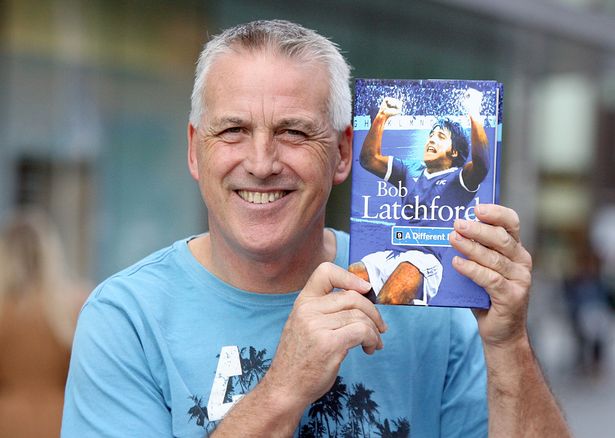
@somegreengrass
Interesting that you mention the Chelsea V Everton match in this interesting article. I was at that game that day too. Big Bob was my teenage hero, but the game was also notable for the appearance in the Chelsea team of another “Blue Icon” Duncan McKenzie. Some weeks previously, our manager, the tactical genius that was Gordon Lee, decided he “didn’t like fancy Dan players” and sold Duncan to Chelsea. He returned to Goodison weeks later with his new paymasters and was afforded a heroes welcome. He then preceded to open the scoring, upon which the home “Street End” (Glwadys Street) started the time honoured chant: “We all agree, Duncan McKenzie is magic” the only time in 40+ years supporting Everton that I ever heard an opposition goal cheered to the echo at Goodison Park! Duncan later called his biography “The Last Fancy Dan” a sideswipe at Gordon Lee I always felt!
LikeLike
I was at the 3-2 win a year later. My first ever game.
LikeLike
That was the game that saw the return to Everton of icon Duncan McKenzie. Our manager at the time, the tactical genius that was Gordon Lee, known for his dour demeanour and also dourer brand of football had sold the gifted one to Chelsea, because he didn’t like “Fancy Dans”. Duncan opened the scoring for Chelsea that day, and the whole of the Glwadys Street End burst into the time honoured chant: ” We all agree, Duncan McKenzie is magic”!. The one and only time in 40+ years as an Everton fan I heard an opposition goal applauded. In finishing, Duncan’s biography was called “The Last Fancy Dan” surely a sideswipe at the manager who couldn’t see what every Everton fan did.. That Duncan was indeed magic!
LikeLike
I wrote about Duncan for Sabotage Times a while back. I might post it up here in a few weeks
LikeLike